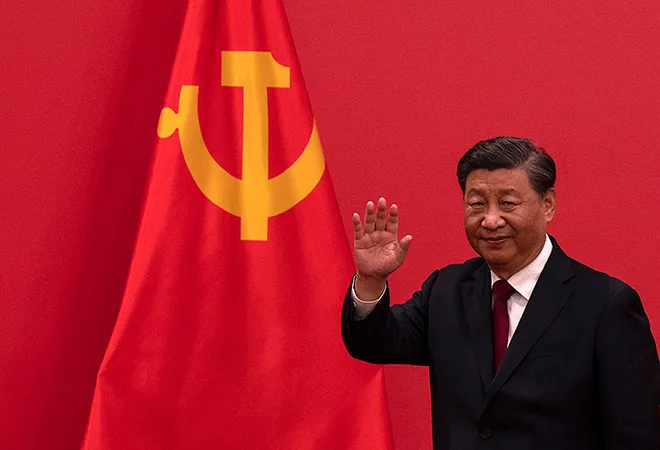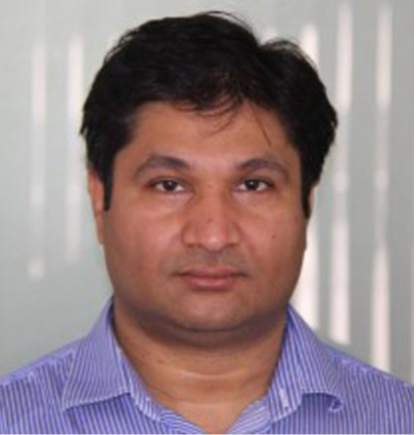-
CENTRES
Progammes & Centres
Location
Xi Jinping in his latest bid to tighten his control has brazenly promoted his supporters and resized the Communist Youth League during the 20th Party Congress

On 22 October 2022, Chinese national politics took a darker turn, towards a staunch communist administration. At the end of the 20th Chinese Communist Party (CPC) Congress Meeting, Xi Jinping secured the General Secretary seat of the CPC for the third time and strove to eliminate all effective opposition inside China over the next five years. His comprehensive and meticulous planning, for this once-in-a-five-year event, is a lesson in Realpolitik.
The way Xi evicted his predecessor, Hu Jintao, in front of the international media, was a crude but ruthless message to all his potential domestic challengers that they would meet the same fate. Moreover, his brazen induction of all his loyalists and near elimination of the Communist Youth League (CYL) members portrays his unbridled power in China.
Since Deng Xiaoping’s demise, Chinese politics has run on a few unspoken but unbroken traditions for the last 25 years. The CPC is composed of mainly two member factions, the elitist coalition whose members are princelings, the progeny of veteran communist party leaders and high-ranking officials. The second faction is the populist coalition composed of CYL members who have climbed the political ladder through their hard work and experience. The CPC has always maintained a delicate balance between these two factions irrespective of whoever served as the general secretary.
The CPC is composed of mainly two member factions, the elitist coalition whose members are princelings, the progeny of veteran communist party leaders and high-ranking officials.
Therefore in 2012, when Jiang Zemin promoted Xi Jinping to the general secretary post, the CYL faction led by Hu Jintao promoted Li Keqiang to the premiership for an effective balance. In the latest leadership reshuffle, however, this balance has gone down the drain. The CYL faction has faced a complete wipeout from the top political bodies namely, the 24-member Politburo and the seven-member Standing Committee. Only a few CYL members such as Hu Chunhua have survived in the larger 205-member Central Committee of the CPC. However, their effective political emasculation is too hard to miss.
In addition, Xi Jinping has finally broken the tacit agreement on political purge in China. In general, dictatorships are dangerous for top political leaders because the loss of power leads to the loss of their privileges, including their lives. China witnessed numerous purges during Mao Zedong’s autocratic rule where several top leaders, including Liu Shaoqi, were killed. Deng Xiaoping strove to break away from this gloomy process and initiated the tradition of retirement at 68 years for the top political leadership. The retirement also had an inherent agreement that once retired, the successors will not purge their predecessors in future.
Xi, in his initial few years, respected this tradition, however, soon his war on corruption reached the lower rungs of retired political and military leaders. In subsequent years, Xi decided to arrest and prosecute close associates of former general secretaries to further strengthen his political grip. However, the safety of the person and privileges of erstwhile rulers remained intact. During the recent leadership reshuffle, Xi has made a substantive dent in even that tradition. The public display of Hu Jintao’s removal from the front row of the CPC meeting, especially after the international media had entered the venue, aimed to humiliate him before the world.
The Chinese official media has offered several explanations for the incident, stating that Hu was sick and slouching, and therefore, was removed for a medical checkup and recuperation. However, numerous videos of the incident reflect a completely different picture. Hu was reluctant to leave and the low-rung staffer’s insistence on his removal shocked him. Moreover, none of the medical staff came to assist him and the way Hu walked out of the venue did not show any medical weakness. Further, when Hu was leaving, all attending members barring Li Keqiang remained stone-faced and none dared to clap.
The public display of Hu Jintao’s removal from the front row of the CPC meeting, especially after the international media had entered the venue, aimed to humiliate him before the world.
In subsequent events, Xi has reinforced this aspect by ensuring a comprehensive rout of the CYL faction from the Chinese politics. Senior leaders namely Li Keqiang and Wang Yang were compulsorily retired and Hu Chunhua was demoted from the Politiburo. The Standing Committee comprises Xi’s six closest associates and all speculations of a widespread selection based on merit and not on loyalty are effectively curtailed.
The age profile of the Standing Committee members will effectively prevent any future political threat to Xi. Most members will be at the retirement age by the next Party Congress in 2027, except Ding Xuexiang, who is relatively a political lightweight. Ding is a career party manager and has worked as Xi’s chief of staff. Furthermore, no woman or ethnic minority leader has found representation in the Politburo or the Standing Committee. Even in the Central Committee, there are 11 women out of 205 members, effectively at five percent. Xi has done away with all pretensions of female and ethnic equality promotion in his leadership shuffle.
Xi has even preferred loyalty more than merit in the Central Military Commission (CMC), the top CPC military organ. He has promoted his old friend General Zhang Youxia as the first Vice Chairman despite his age at 72 years. Zhang shares deep personal and family relationship with Xi and both their fathers served in the same Northwest Army Corps in 1947.
Further, the People’s Liberation Army (PLA) Air Force lacks any representation in the CMC while the PLA Navy has a quasi-member. The naval representative, Admiral Miao Hua served his entire career in the Chinese army and rose to the lieutenant general rank. He was laterally transferred to the Chinese navy in 2014 but is still referred to as the army representative. Therefore, the PLA’s drive for joint war and interoperability which needs increased and near-equal representation in the top military administrative organs has remained an aspiration. This over-dominance of the PLA Army will influence China’s threat perceptions and provide greater emphasis to its land disputes.
A once-in-a-century pandemic has also rocked the ruling power as it brought enormous grief and difficulties in the everyday life of the Chinese citizens.
On one hand, Xi’s performance at the Party Congress projects his unrivalled authority over China, but on the other hand, it paints a darker picture of Xi’s growing isolation and apprehension. The Chinese communist government is fumbling for a strong legitimacy to rule. It sailed through earlier years on its economic growth agenda which effectively kept the masses focused on the development and enhancement of their living standards, but would require a new agenda for the third term. In addition, a once-in-a-century pandemic has also rocked the ruling power as it brought enormous grief and difficulties in the everyday life of the Chinese citizens. Xi has further exacerbated this by instituting the the ‘Zero-COVID’ policy.
In the face of these twin failures of the CPC, Xi has attempted to call for nationalism and Marxism to reinforce his legitimacy to rule. However, he hasn’t succeeded so far. His focus on the coming era of ‘the struggle’ in his latest report to the Party Congress, alludes to a challenging future. Moreover, China’s external environment is turning markedly hostile. In the face of all these challenges, Xi needed to select leaders from a broad base of party membership based on merit and experience. Instead, he has chosen to enjoy the close proximity of his friends. The portents for China are darker than before.
The views expressed above belong to the author(s). ORF research and analyses now available on Telegram! Click here to access our curated content — blogs, longforms and interviews.

Atul Kumar is a Fellow in Strategic Studies Programme at ORF. His research focuses on national security issues in Asia, China's expeditionary military capabilities, military ...
Read More +